Episode 3: How Manure Management Brought Us Peace
Categories:
As it turns out the key to being a successful farmer is having a crap management plan. (Yes, this episode is about poop.) Learning about “waste management” taught us about the importance of managing all the crap in our lives. The more pressure we put on ourselves to get better and be better, the more striving we do, the longer our to-do lists become, and all the things we have to manage start to accumulate. And, because there’s no downtime, or ritual that we have for dealing with the crap, it just collects. And when it collects, it stinks. In this episode, we talk about how we learned to sustain ourselves and our farms by creating and following a plan to manage all the crap before it becomes too late. (You can’t duck the poo.)
Show Notes & Episode Transcript
Every day Greg and I perform a ritual. It’s a transformative one.
And, well, It’s one we didn’t know we needed at the start of our guanaco adventure, but now it’s become an essential one for our mental health and our farm’s survival.
“I texted Mary to let her know her buckets are full. She’s going to come to pick up her poop sometime today,” Greg said.
“Oh good—that will give us more room for collection,” Lisa said.
“You can dump a few more buckets into the garden,” Greg said.
“Okay,” Lisa said.
That’s right: we are talking about the ritual of turning waste into resources.
And before I go any further I want to give you a heads up. If you are listening to this with young ones there’s a lot of potty talk in this episode. Some people might not mind that, but if you are trying to keep your kid from using certain words that refer to waste—you might want to put this on pause until those tender ears aren’t within listening range.
Anyway, the ritual I’m talking about is one where we collect our animals’ poop and use it as fertilizer. And, in the process of learning about and performing this ritual, taught me to apply the ritual more globally.
So, in general, I’m talking about dealing with all the crap. Crap in our pastures, crap in our minds, and crap in our lives.
I think of it like this: Crap is a byproduct of living. Our animals produce it, and so do we. There’s also a particular kind of crap that tends to accumulate in a toxic way. One we can’t just flush away or shovel up. That’s the kind that comes from what I call the bigger, better, faster, stronger…more approach to life. See, the more pressure we put on ourselves to get better and be better, the more striving we do. Which leads to being busier and to-do lists. Then all the things we have to manage start to accumulate And because there’s no downtime, or ritual that we have for dealing with the crap, it just collects. And when it collects, it stinks. So if we want to sustain ourselves and our farms, we have to have a plan to manage all the crap before it becomes too late.
“ The conclusion is when you arrange the poop to occupy its proper place in the ecology of the farm, it stops being bad things—parasites and flies that add badness to your herd and starts being a source of all the vegetables that we eat all winter,” Greg said.
“Fertility,” Lisa said.
“Fertility adds all the goodness to our farm,” Greg said.
“It’s a pretty easy switch,” Lisa said.
“Yes, and kind of an obvious one,” Greg said.
“To most people,” Lisa and Greg said as they laughed together.
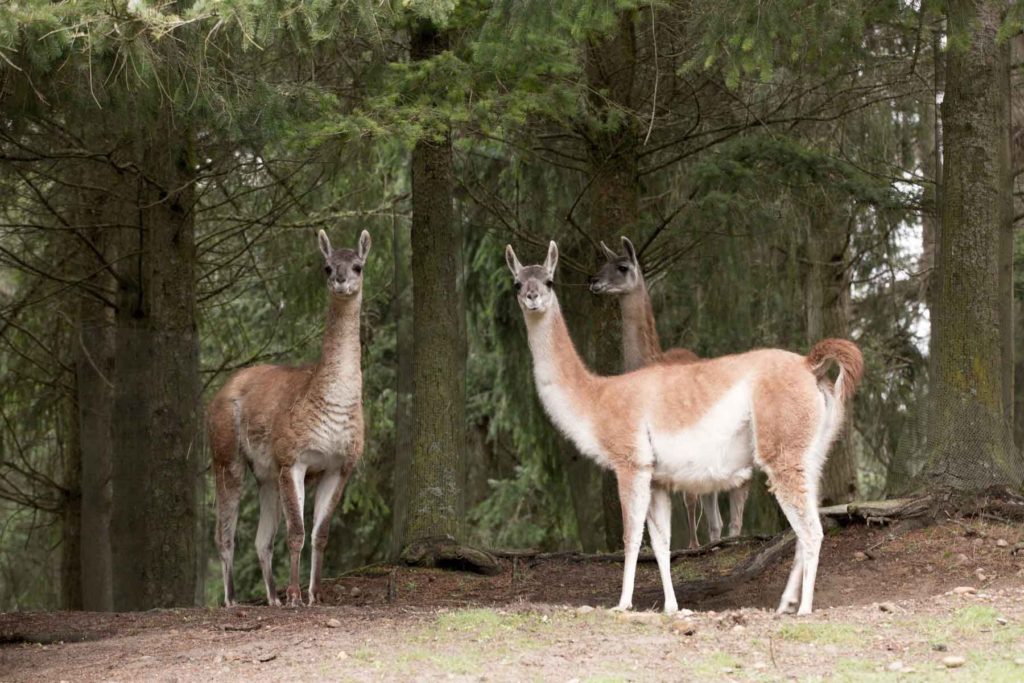
In this episode, We are going to (once again) laugh at the fact that we were completely naïve when we first started raising our guanacos and in this case, we didn’t understand the necessity of managing our animals’ poo.
We are also going to talk to two wonderful people who taught us a lot about poop management.
You might be curious about what our guanaco’s approach to poop management is, so we are going to tell you about that too. I think you will find it to be very interesting and quite amusing.
Then I want to let you in on the ritual—that’s our poop management plan– and how it’s transformed our farm and has helped us to feel more peaceful and learn to live healthier lives. In the end, my hope is that you start to think about your own poop management plan (even if only in a metaphorical sense) and why it’s so important in your own life.
So, my poop management story starts, once again, at the beginning of learning to raise guanacos. When we didn’t really know much and had to learn it all by ourselves. The guanacos were finally here on our Whidbey Island Farm and we were still adjusting to our new lifestyle.
We’d navigated all sorts of obstacles that I talked about in episode 2, and we’d also settled into living a slower-paced life on a beautiful patch of land. There were parts of it that were beyond my dreams—like sitting on the back porch watching our animals graze in the pasture. I could sit out there and spin fiber or read or nap and it was complete bliss. Until it wasn’t Here’s how we remember it.
“It’s the summer and one of my favorite things to do is to sit on the back porch and watch the animals. So we had our Adirondack chairs out there, we’d sit out there, we sit there in the morning with coffee in the afternoon with a beer. It was just so pleasant. And then eventually you are looking out, not just on the animals, but you are looking out on the pasture with lots and lots of piles of poo,” Lisa said.
“And the flies came out,” Lisa said.
“Yes, it wasn’t good,” Greg said.
“I started to think this wasn’t good, but I also just sort of accepting it because you know, I’ve been around other farms that smelled like poo also, you know. And never really asked, hey excuse me, what do you do with your poo?” Lisa said.
“So, do you remember? It was such an innocent question, it was like um, honey, do you think we are supposed to be doing anything with this poo? And you said…
“I thought it was just going to become part of the ground. Just works its way into the ground,” Greg said.
“So I’m like, I don’t know. And especially because we had been to dinner with John and he had made a comment about how important poop management was for his consulting on dairy farms,” Lisa said.
“I think what he told us is that if there wasn’t a plan to manage the poop on a dairy there was nothing he could do to help them,” Greg said.
“So, somehow that went in and I was like, uh oh,” Lisa said.
“Yeah, oops,” Greg said.
“We are kinda beyond help at this point,” Lisa said.
Yup, that’s pretty much how it went. There was the smell and the flies… and then we had that dinner with John.
Dr. John Fetrow is a dear friend, who was kind of a big wig in the dairy industry. As a retired veterinary professor, he’s got a lot to say about animals and poop. So I decided to ask him to revisit that moment with me. And to lend his expertise to our fiber life story. You know—so we can all be really well versed in matters related to poo.
Now, as I said, John is a retired veterinarian. He’s brilliant and has a ton of expertise. He’s been around the world interacting with farming and animal production for more than 40 years… but for our purposes, he’s going to tell you about a highlight in his career that will serve as the perfect introduction:
“I was asked by public tv to do a segment on a children’s program called Dragonfly TV. I guess I was meant to be some kind of veterinarian science kind of a guy, but we were on a dairy farm and had a good time talking about what I did. I’m going to go down in history having said boogers and snot on public tv. But anyway they chose to christen me Dr. Moo for that half-hour segment of public TV. And I think after tonight my legacy will be that I will be referred henceforth as Dr. Poo.
Okay, so here’s what I asked Dr. Poo had to say about poop management.
“One day we were having dinner and you mentioned that you didn’t consult with any farm if they didn’t have a poop management plan. Like they were off your list. Forget it. I let that go by, but my eyes got really wide. And I was like, oh shit. We don’t have a poop management plan. What is so important about a poop management plan?” Lisa said.
“One of the things you see of smallholders is that they start out being enamored of the animals. They think sheep are cute or goats are cute or how about if we have one backyard cow or 14 chickens or whatever and their view is that the pictures you see everywhere are endearing and cute. People cuddling lambs and all that,” John said. And they get into it without realizing that stuff comes out the back end. And at some point, you need to deal with it. Pretty early in the game. And it’s going to be an endearing and enduring part of your life. As soon as you start getting animals, poop becomes, maybe not central, but…
“A priority,” Lisa interjects.
“It’s a priority because poops are going to happen and it’s going to happen every day. and you are going to have to deal with it. It can either be a mess and an annoyance or it can be a wonderful resource,” John said.
I hope you can hear what we love about John. He’s got a sense of humor and he loves to say Poop as much as I do! Go on Dr. Poo!
“From a veterinary point of view, it’s very important that it be managed for the health of your animals. Both in terms of poop are full of bacteria and you would want it to be separated from your animals as readily as possible so they don’t swim in it or wade in it or..” John said.
“What you are talking about is literally—what you do with the poo,” Lisa said.
“Yes, from the moment it falls out of the back end of the animal. What do you do from that point? It’s not their responsibility,” John said.
“And you can’t do nothing—that’s not an option?” Lisa asked
“You need to figure out what you are going to do with it. How are you going to collect it?” John said. How are you going to store it? And once you’ve stored enough of it, what are you going to do with it? Because you can’t just push the little silver handle down and watch it go down.
Okay—so I never really thought about that option. But he’s right, guanacos can’t be potty trained. And, they can’t rake up their own poop.
You’ve got to do something with it, you’ve got to shovel it, fork it, deal with it, and probably pile it, and then sometimes during the year, you’re going to have to put it somewhere.
“There are a lot of people who don’t keep animals after a while or fail and get rid of their animals and look back with horror on that phase in their lives largely because they didn’t figure out what they were going to do about poo in the beginning. They didn’t start there and get that system set up and then it became onerous and odiferous and sloppy and muddy and…” John said
“Gross,” Lisa said.
“And gross and they are wandering around in Wellies that are sort of brown for the bottom six inches because they couldn’t figure out what else to do with it,” John said.
So, listen up, here’s Dr. Poo’s bottom line (every pun intended):
You can’t duck the poo. It’s just the way it is.
And, if you do it right, it makes all of the animal care wonderfully more pleasant.
If you do it wrong it makes having animals a pain in the ass—every pun intended.
Okay, if you can’t duck the poop, what do you do with it? It’s again, one of those things we had to learn by doing. So, I went into research mode and got in touch with the former owner of our farm, Mary Donaty. She’s just up the street now and is always willing to help.
“So then I got on the phone or I texted Mary, and then I said, What did you do with your poo? You know. It’s kinda funny if you just randomly start talking poop with people. She had a whole system,” Lisa said.
“Yes, of gathering it up and moving it,” Greg said.
“And then she also advised me to post on drewslist which is like our Whidbey island version of Craigslist. It’s teeny-tiny, and that people would want our poo,” Lisa said.
“Right and would come to get it and haul it off for us,” Greg said.
“So all of the sudden it goes from an eyesore in the pasture that’s gathering flies to what we have to do something with it and we also probably have something that people want,” Lisa said.
“So we decided, like, now we are poop gatherers because we are starting our poop management plan which requires us to,” Lisa said.
“Transport it,” Greg said.
“Exactly,” Lisa said.
“And put it someplace,” Greg said.
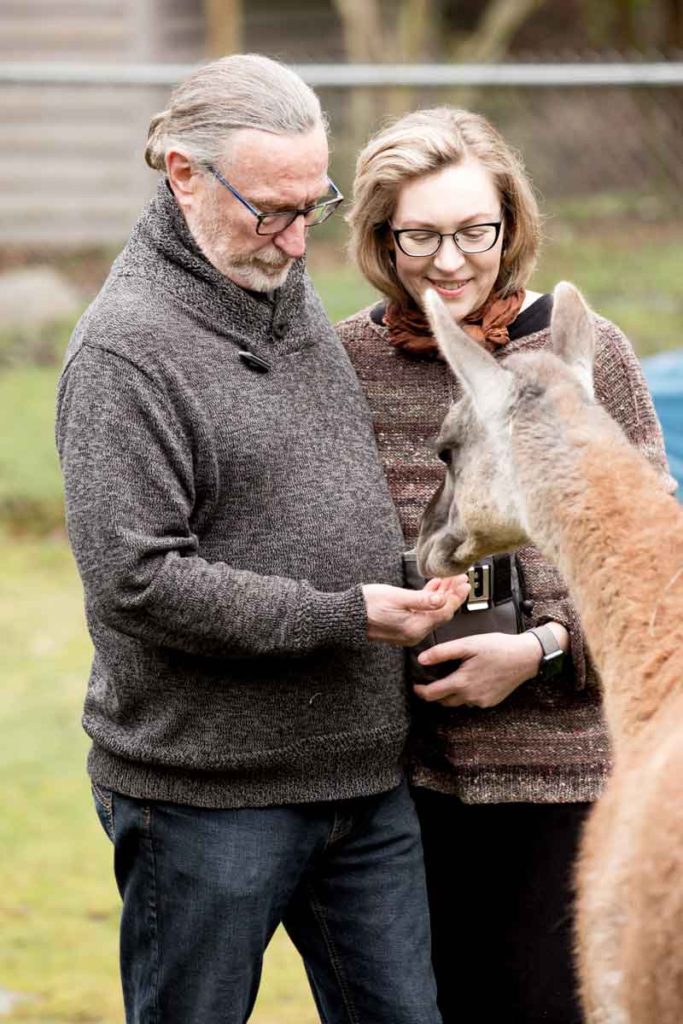
Okay, so now that we’ve established we needed a poop management plan, and we’ve figured out what that will entail, I want to let you in on the guanacos’ perspective of poo.
Guanacos don’t know that their poop is a source of renewal for us. But they do have a particular way of treating their own poo. Unlike goats or sheep or horses or cows, camelids, and I’m talking specifically about guanacos, don’t eat where they poop. They are super smart about it. And does prevent them from ingesting parasites and bacteria because, as Dr. Poo told us if they poop far away from the grass they graze on, the grass stays clean and healthy.
But, if farmers (like us) don’t take care of the poop, and it accumulates, then bad things happen.
“You are the steward of your animals. You are responsible for that stuff and you have to figure out what you are going to do with it for the health of your animal. Most of the important parasites that we worry about in domestic livestock are spread through manure. So parasite management particularly for grazers, a lot of that parasite control is really manure management.
It doesn’t come out of the end of a drug syringe really, it’s managed by managing poop properly,” John said.
“Basically, what are you saying there, you can’t mix your poop with your food.
Greg: Well yes, that’s the first thing, it’s the camelid imperative, isn’t it? Biological imperative—not to poop where you eat?” Lisa said.
“When they were pooping out in the pasture, we weren’t taking it away from them so that they weren’t pooping where they were grazing,” Greg said.
“Then, they are very meticulous in certain ways,” Lisa said.
“Fastidious,” Greg said.
“And if the poop pile gets a little too much poop in it,” Lisa said.
“They move it,” Greg said.
“So, then it goes from a poop pile to a poop scatter,” Lisa said.
“Right, a poop layer,” Greg said.
“All over the pasture which then limits where they are going to eat,” Lisa said.
“That was really a tremendous oversight on our part, not to understand that they have genetically developed a way to manage their own health by not eating where they crap. It’s very smart on their part,” Greg said.
“It is, it is, but we were not giving them a choice to exercise their smartness,” Lisa said.
“Their DNA,” Greg said.
Once again, good things to learn, important things to consider. But here are some other funny things about our guanacos and their poo.
“Why do you think that when one guanaco girl poops then everybody else has to go sniff and poop in the same place?” Lisa said.
“At the same time,” Greg said.
“Well they do it sequentially, they take turns, they have to go down the line. Why do you think that is?” Lisa said.
“I’m of course going to make the bad male joke, that it’s going to the movie with a group of girls where when one has to go to the bathroom they all do. I don’t know. But it seems to work that way. And it works that way from the time they are born. Even the babies. If one of the adults goes and poops the little baby has to go and poo in the same spot,” Greg said.
“It’s so weird. And then whoever is the established leader, it used to be Kate, they will choose where the poop party is supposed to happen,” Lisa said.
“And, they will move the pile when it gets to be too much,” Greg said.
“Let’s move this over girls,” Lisa said.
“Right,” Greg said.
“Start over here,” Lisa said.
“I don’t know how they figured that out,” Greg said.
And there’s this: “You clean up the pile of poo,” Lisa said.
“And they immediately go and deposit where I’ve just cleaned up,” Greg said.
“It’s like, Oh thanks for the nice clean potty,” Lisa said.
“Now I have to step over it to feed you, thank you,” Greg said.
Greg usually cleans the paddocks where our males live. We have a new guanaco named Pedro who takes his own poop management quite seriously.
“Would you like to say a bit about your friend Pedro and how his fastidiousness goes?
Greg: Pedro is our new boy. And he has developed….so when it rains, when it is really bad weather, the guanacos don’t like to poo in the rain,” Lisa said.
“Yeah, who wants to go potty in the rain?” Lisa said.
“And the cold,” Greg said.
“Yeah,” Lisa said.
“So they will potty in the barn, well Pedro has developed this method of sticking his hiney out from underneath the roof just enough so that he can poo away from where he has to eat and sleep, but not enough to get himself wet. He just poops exactly six inches outside the roof of his enclosure,” Greg said.
“I think that’s so smart. It’s just like, I’m not going to get wet and cold, I’m just going to do the minimum possible and get my crap outta here,” Lisa said.
Our animals are smart about their poop, and we got smart too. Cleaning the pastures started out as a job that we had to do because of what Dr. Poo told us. We wanted to be good animal stewards and not duck the poop. So every week, Greg and I started going out to the main pasture with our rakes and scoops and filled wheelbarrows full. It took a long time and it felt kind of like a drag. And the wheelbarrow got very heavy. And we really didn’t want to do it, but we knew we had to. So we kept doing it.
And we did find people to come to take our poop away.
Sharon Betcher is one of those people who signed up to receive our poop. Recently, I went to her farm to talk to her and to see how our poop was doing. She lives on this gorgeous savanna-like property that looks out over the Saratoga passage of the Salish sea. She has a border of beautiful tall trees and lots of newly planted ones. It feels expansive and cozy all at the same time. We sat down to talk about her use of our poo.
“Seven years ago when I first came to the island I had been trying to track down alpaca manure because it was some of the most desirable manure that you could put in a garden,” Sharon said.
“The good poo,” Lisa said.
“The good poo,” Sharon said.
“The ruminants digest really well and you can put it immediately in a garden vs. having to compost it. Most steer manure is composted at least three months, maybe six months to get rid of pathogens and to drop the heat of the manure meaning the nitrogen burn of the manure. So alpacas and llamas you can directly put the manure onto the gardens,” Lisa said.
“When I went to an alpaca farmer he started laughing at me. He said “good luck their sister, you got a seven-year wait,” Sharon said.
She explained to me why there’s a shortage of poop here on the island.
“Whidbey Island used to have a lot of dairy operations on it. Now it’s quite reduced. I don’t know if there’s one or two left. So if you think about that we are also noted for our farming and for our vegetable farms and our live produce? Well if you don’t have the animals here anymore and you know that you have to keep your soil alive that adds up to hauling truckloads of manure onto the island,” Lisa said.
“That’s crazy,” Lisa said.
“Isn’t that crazy,” Sharon said.
“I know a vegetarian farmer who also raises all the vegetables who says the day that the manure arrives he starts crying cause he sees his future,” Sharon said.
“There is no ecosystem without an animal so the manure becomes your wealth,” Sharon said.
“So we’ve kind of created this terrible scenario where we’ve removed fertility by moving animals elsewhere and then having to re-import it,” Sharon said.
Now I wanted to kind of geek out on all the ways you can use poop, so I had Sharon describe what she did with our guanaco poop.
“We have six acres of land. There are three different ways I’ve used guanaco poop. One is really a top dressing. I push back all of the straw around my strawberries and then top dress my strawberries because it’s a nice way for it to break down slowly. And then I put the straw back on top of it and created a nice little fertilization zone for the strawberries,” Sharon said.
“Some of the others. I dug into our raised beds. When you do raise beds gardening it’s notoriously hard to keep fertility in those beds….. raising vegetables is kind of a nutrient mining operation. You are constantly stealing from your soil bank and it has to be replenished.
And raised beds are the worst because you are going year after year to that same zone to try to get your nutrients. So in those places, I dug in the guanaco,” Sharon said.
“And then the third place is we start building basically a debris zone for the woody matter. We started creating these furrows of landscaping debris where we piled it year after year. It’s very slow to break down unless you can get some starter in there to get a little heat going, right. And so we have used both the guanaco poo and night soil from the city. You wouldn’t believe it because we built those up for about 4 years and you can hardly see a 4 -6 inch little burrow at this point because we are creating soil in other words,” Sharon said.
“So we could say that fertility is synonymous with waste,” Lisa said.
“Absolutely. Soil takes dead things and makes them live. We think of poop as waste. But soil has to be a living community in order for us to eat well. We are all interested in probiotics and prebiotics –well there it is –right there in your soil. And so the living matter is the manure from the animals that keep an ecosystem healthy,” Sharon said.
The other part that I’m so touched by is this. Sharon is academic. But the way she talks about her land—and the way she treats it—including how she uses our poop touched me.
“I’m an independent scholar and wanna be a farmer. In the decade where I grew up, there was no possibility that the daughter would inherit the land. She didn’t even get cows. My brothers all had cows set aside in order to create their futures. I’ve come back around, I can spend time with the land which for me is a form of contentment,” Sharon said.
So, there you have it—all the wonderful reasons you can’t duck the poo. You have to manage your crap. Believe me, Greg and I became committed to our poop management plan. Raking and dumping and transporting about once a week. And then something started to happen……
I started cleaning the pastures more often—just so it wasn’t such a big job all at once. I figured, if I did it more frequently, it would be a smaller job and our animals wouldn’t scatter the pile around so much. At first, it was every other day, and then I just decided to do it every day. And after a while, the daily poop gathering became a ritual. Sure, physically I was literally collecting crap and dumping it, but I also started to notice that it had a calm effect on me.
Pretty soon, I stopped thinking of it as something I had to get done fast so I could get on with my day and do the “real” things. And I started treating it as reflection time.
You might wonder if it was like meditation, but actually, I think it was more like dreaming.
With every raked pile, I let my mind wander wherever it wanted to go. A stream of consciousness just flowed. This act seemed to clear my mind of worry like I was sorting through things by sorting through poo. And like the agenda of having to do better or be better—the striving that filled up so much space in my former life fell away as I started to clear out the pasture space.
It was perfect—it was mandatory, remember—you can’t duck the poo. And now, I look forward to it. I have a whole process of going into the barn, changing into my poop boots, and gathering up my tools. I stash the rake and scoop in the wheelbarrow and walk into the pasture. Whatever the weather, I take it in. The guanacos watch quietly. And I just rake. And then scoop. And then dump. I get into a rhythm where I don’t have to think about what my hands are doing. And I just take my time—one pile at a time, one thought at a time. When I’m all done, I take the wheelbarrow out to the big pile where we store the poo for others to come to pick up or dump it in our own garden. And I feel satisfied. My mind is quiet. I’m just a farmer carrying out my poop management plan….but it’s really so much more.
“What’s your attitude about poop now?” Lisa said.
“My attitude is that it is part of what we do twice a day, it’s just part of the routine of managing the herd and it grows incredible vegetables. It does wonders for the soil, there are tons of worms and bugs and all kinds of things going on in that soil. And it’s just wonderful,” Greg said.
“It’s true, people who come to get vegetables from us and visit our garden, they always have, their eyes are wide open like they can’t quite believe how big everything is compared to what they’re growing and what they’ve seen,” Lisa said.
And we’re just like, we don’t do anything, we just put poop in there.
“Every morning when I carry at least two buckets full and I dump it in the garden, I feel like I’m depositing goodness. It’s not like I’m getting rid of waste. Okay-another pile of goodness,” Lisa said.
As Dr. Poo puts it: after you’ve worked your poop management plan for a while it starts to pay off.
“You get up one morning and look out and say, wow, my piece of the world is a really remarkably different place because I managed poo properly,” Dr. Poo said.
“I totally agree. It’s awesome,” Lisa said.
So, maybe you don’t have to manage literal poo in your pasture—but maybe you do. Either way, I hope you enjoyed listening to our story about how we learned that managing our poo was a vital source of renewal in many ways. You know now, when I sit out on the back porch, I have a greater appreciation for all that grows here on the farm, and a lot fewer flies!!
Tune in next time when we talk about the visible and invisible connections that exist in our herd and in our lives. We want to share how we learned to halter and lead our guanacos. And what happened when one of them got loose.

Hi, I’m Lisa!
I’m a fiber farmer and land steward committed to making beautiful things and making a beautiful life. I raise animals for their fiber, ceate things you can buy, and write and tell stories about the discoveries I make along the way.
2 Comments
Leave a Comment Cancel Reply
More from a Fiber life...
Episode 4: How is life like a tapestry weaving?
We make countless decisions every day—from whether to snooze the alarm, to what to eat for breakfast, to how long…
Episode 3: What will you do with this one wild and precious life?
You know how frustrating it can be when you’re exhausted and you finally get to lay your head on the…
Episode 2: When a couple finds their third thing
Every couple needs a “we” or a third thing—a focal point that exists not solely within one individual but rather…
Keep the connection -to a- fiber life!
Be the first to learn shop updates, new essays, events, and special offers!
Put me on the list!
Visit-the-Shop
Our animals work year round to grow the most exquisite fibers because we’re the only commercial source of guanaco fiber in the US. Spinners, knitters, and natural fiber wearers, we can’t wait for you to touch the softness.
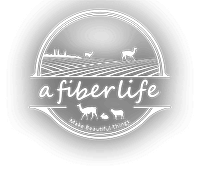





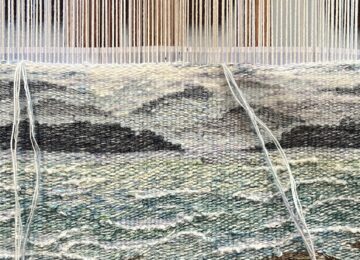
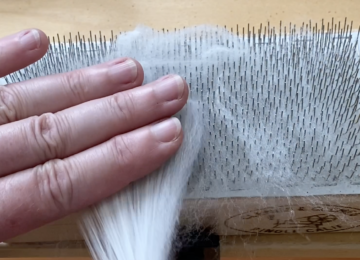
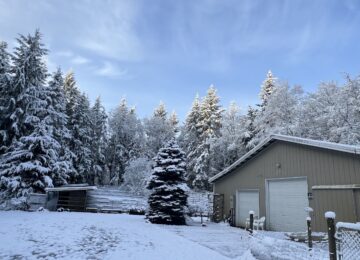
Lisa and Greg the poop that goes from one pile to the next if you do not pick it up as you are now doing daily is called a string of pearls. SMILE!!
Also for fly management look into Spalding labs fly predator’s
Hi Lisa,
I’m a friend of your mother here in Sewickley. When she mentioned that you moved to Whidbey Island I told her about Marcia Derse, a quilt fiber designer who lives on Whidbey as well. Hope you can look her up sometimes since you are into fiber design too.
This week your mother mentioned your podcast. I just listened to this one on poo. Fascinating. A great form of energy for plant growing and soil development.
Wishing you and Greg continued fun and success with the guanacos.